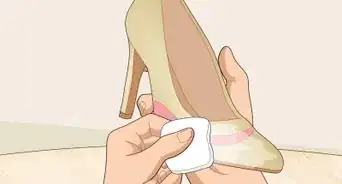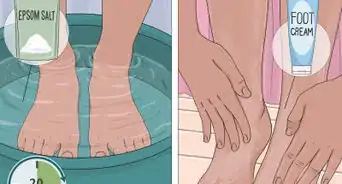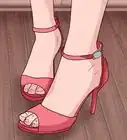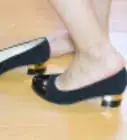This article was co-authored by Jordan Stolch. Jordan Stolch is an Image Strategist, Style Advisor, and the Founder of MiKADO - a concierge personal styling firm. With over a decade of experience, Jordan specializes in helping people eliminate the confusion and insecurities associated with how to dress in order to build a powerful image and use clothing to their strategic advantage. Jordan trains entrepreneurs, business leaders, and corporate executives in the foundations of "power dressing", from some of the country's preeminent companies such as Morgan Stanley, Deloitte, Berkshire Hathaway, Universal Music Group, Starbucks, and Disney. She works with clients both in-person and virtually, teaching them how to take the confusion out of style so they can operate at a higher level. Jordan earned her BA in Psychology from the University of Waterloo and studied Merchandise Marketing at the Fashion Institute of Technology (FIDM).
There are 11 references cited in this article, which can be found at the bottom of the page.
This article has been viewed 317,011 times.
High heels are appropriate for many formal occasions, and are a great addition to an outfit, but they can become uncomfortable or painful if they are the wrong size, too tall, or rubbing uncomfortably against your feet. There are several ways you can choose and adjust heels so that you don't feel pain while wearing them.
Steps
Buying the Right Heels
-
1Get your feet sized at a shoe store. Measure the length and width of your feet at a shoe store, and ask for assistance to find the most accurate size of shoe to buy.
- Make sure to measure both feet. It's common to have slightly different sized feet. You may actually need to get two different sized shoes, or make sure to get the size of the larger foot.[1]
- Note that you will be a different number size in different stores and brands, so always try several sizes. Also find your European size for brands that utilize them.[2]
- Every shoemaker has the ability to stretch your shoes about half a size more for you, in case you've bought a pair of heels you love but that are too snug.[3]
-
2Try on plenty of shoes. Try on a wide variety of heels at the shoe store, and try each one in a couple of different sizes to see which one feels best.
- Don't just stand up in the heels, but walk around the store for several minutes to see what they feel like after some time.
- Look out for the backs rubbing against your heels or for your toes feeling scrunched inside as an indication that the heels are too small, or your feet popping out of the backs or sliding forward when you walk as an indication they are too large.
Advertisement -
3Consider a lower or more comfortable style. Choose a thicker and more stable heel like a platform, wedge, or chunky heel to provide more support and weight distribution. Shy away from pointed-toe styles if you have wide feet or toes, opting for round or almond-shaped instead. You can also buy heeled boots or heels with ankle straps to help support your ankles.[4]
- Sit on a chair with bare feet and one one leg extended out in front of you, then relax your foot and ankle. Measure the distance between the end of your big toe to an imaginary line that extends straight out from your heel. This is the ideal height of heel for you, as it most closely mimics your natural shape.[5]
- More important than the style of heel is where the heel is placed. Ensure that it's positioned squarely under the heel bone rather than at the very back of the foot.[6] If you go for a skinnier heel, look for one that curves in slightly at the top rather than forming a straight line.[7]
-
4Invest in quality heels. Choose high-quality brands or materials for a higher likelihood of comfort. Look out for genuine leather, solid rubber soles, and other sturdy textiles that appear to have well-constructed seams and joints. You can even tug a little at parts of the shoe to test their strength.
Adding Inserts to Heels
-
1Buy an insole for the sole of the foot. Buy an insole that fits heels for increased comfort across the whole length of your sole. You might want to buy these ahead of time or at the same time as the heels to make sure the shoes still fit properly with the inserts in.
-
2Get padding for problem areas. You can buy cushioned gel or fabric inserts to fit areas like the ball of the foot and the back of the ankle to prevent rubbing, sliding, or pressure.
- Any brand of moleskin is a great option for padding, as it can be cut to any size or shape, sticks directly onto the foot, and stays put on tricky areas or over already-formed blisters.[8]
- Be sure that any insert you buy doesn't have so much bulk that it makes your shoe too small to fit into.
-
3Use heel or strap grips to keep heels in place. Find a product meant for sticking to your heel area or even to the strap of a slingback to prevent rubbing and keep your heel inside a shoe that may be slightly too large.
-
4Purchase moleskin at your local drugstore. If your heel or the sides of your foot are rubbing against the shoe, moleskin can help. One side is adhesive, and the other is soft and almost fuzzy. Stick this in the spot of your shoe that's causing the most discomfort, which should make wearing your heels easier.[9]
Wearing and Walking in Heels
-
1Practice heel-toe walking. Try to step like you would in any other flat shoe, heel to toe. It can take some getting used to maintain balance on a thinner heel. Take small steps and look at yourself walk in a mirror if you can.
- It's a good idea to practice walking around your house in heels to get used to their feel and the right way to walk.
- In fact, you should wear your heels at home first to break them in. If they're too loud to wear around your house, wear them with socks overtop.[10]
-
2Use good posture. Keep your abs engaged, your shoulders back, and your head up. Note that your posture in heels will require more curves in your body, with your back slightly arched and your chest and pelvis pushed forward. Get used to walking with this new, slightly more forward center of gravity.[11]
-
3Find support when you're on stairs or uneven surfaces. Hold onto a railing or wall when you can to lend support and prevent catching a heel or rolling an ankle.
- Wear a wider heel for outdoor surfaces, to prevent them from sticking into dirt or grass or causing you to slip or injure an ankle.
-
4Relieve the pressure occasionally. Take a break from your heels every now and then while you're wearing them. Try slipping off your heels while you're sitting down, or even elevating or massaging your feet to bring circulation to them.[12]
- Gently rotate your ankles and spread your toes apart under the table when you can to provide relief and prevent injury.[13]
-
5Wear socks or tights. Slip on no-show socks that will hide under your heels, or wear tights or stockings to make heels more comfortable if they tend to rub against your feet, especially after sweating a little.
-
6Simply reduce the amount of time in heels. Limit the period of time you wear heels to a minimum, as best you can. Instead of wearing heels through the whole day, try wearing a flat during work and save the heels for going out at night.
Expert Q&A
Did you know you can get expert answers for this article?
Unlock expert answers by supporting wikiHow
-
QuestionHow do you wear high heels comfortably?
 Jordan StolchJordan Stolch is an Image Strategist, Style Advisor, and the Founder of MiKADO - a concierge personal styling firm. With over a decade of experience, Jordan specializes in helping people eliminate the confusion and insecurities associated with how to dress in order to build a powerful image and use clothing to their strategic advantage. Jordan trains entrepreneurs, business leaders, and corporate executives in the foundations of "power dressing", from some of the country's preeminent companies such as Morgan Stanley, Deloitte, Berkshire Hathaway, Universal Music Group, Starbucks, and Disney. She works with clients both in-person and virtually, teaching them how to take the confusion out of style so they can operate at a higher level. Jordan earned her BA in Psychology from the University of Waterloo and studied Merchandise Marketing at the Fashion Institute of Technology (FIDM).
Jordan StolchJordan Stolch is an Image Strategist, Style Advisor, and the Founder of MiKADO - a concierge personal styling firm. With over a decade of experience, Jordan specializes in helping people eliminate the confusion and insecurities associated with how to dress in order to build a powerful image and use clothing to their strategic advantage. Jordan trains entrepreneurs, business leaders, and corporate executives in the foundations of "power dressing", from some of the country's preeminent companies such as Morgan Stanley, Deloitte, Berkshire Hathaway, Universal Music Group, Starbucks, and Disney. She works with clients both in-person and virtually, teaching them how to take the confusion out of style so they can operate at a higher level. Jordan earned her BA in Psychology from the University of Waterloo and studied Merchandise Marketing at the Fashion Institute of Technology (FIDM).
Image Consultant & Style Advisor My first tip is to break them in by wearing them around your house first. A lot of women go to work for the first time in high heels and are uncomfortable because they've never worn them before. If your shoes are too tight, a shoemaker can stretch them for you. Lastly, if your high hell is rubbing on your foot, buy some molskin and place it on the problem areas of your shoe.
My first tip is to break them in by wearing them around your house first. A lot of women go to work for the first time in high heels and are uncomfortable because they've never worn them before. If your shoes are too tight, a shoemaker can stretch them for you. Lastly, if your high hell is rubbing on your foot, buy some molskin and place it on the problem areas of your shoe. -
QuestionWhat should I do if I want to wear heels but have very wide bunions?
 Community AnswerTry something like moleskin to keep your bunions from rubbing. This will make wearing heels more comfortable.
Community AnswerTry something like moleskin to keep your bunions from rubbing. This will make wearing heels more comfortable.
Warnings
- Avoid cheap shoes. The price tag is attractive, but inexpensive shoes are often made with less quality materials that can cause more discomfort.⧼thumbs_response⧽
- Stay away from heels that have soles made of wood or hard plastic, as these will have less give against your feet and the ground than leather or rubber soles.[17]⧼thumbs_response⧽
References
- ↑ http://www.healthyfeetstore.com/different-sized-feet.html
- ↑ http://www.collegefashion.net/fashion-tips/a-girls-guide-to-high-heels-part-2-how-to-buy-high-heels/
- ↑ Jordan Stolch. Image Consultant & Style Advisor. Expert Interview. 25 September 2020.
- ↑ http://www.bustle.com/articles/48334-are-high-heels-supposed-to-be-loose-7-burning-questions-about-buying-and-wearing-them-answered
- ↑ http://www.dailymail.co.uk/health/article-1243726/They-neednt-flat--Our-guide-to-ideal-heel.html
- ↑ http://www.dailymail.co.uk/femail/article-2338506/The-pain-heels-guide-How-feel-like-youre-high-heel-heaven.html
- ↑ http://www.cosmopolitan.com/style-beauty/fashion/advice/a5939/how-to-make-heels-more-comfortable/
- ↑ http://www.cosmopolitan.co.uk/fashion/style/advice/a40035/ways-to-make-high-heels-more-comfortable/
- ↑ Jordan Stolch. Image Consultant & Style Advisor. Expert Interview. 25 September 2020.
- ↑ Jordan Stolch. Image Consultant & Style Advisor. Expert Interview. 25 September 2020.
- ↑ http://illumin.usc.edu/81/walking-in-high-heels-the-physics-behind-the-physique/
- ↑ http://www.medicinenet.com/script/main/art.asp?articlekey=22534
- ↑ http://www.active.com/fitness/Articles/5-Foot-Stretches-to-Prevent-Injuries
- ↑ http://www.bustle.com/articles/48334-are-high-heels-supposed-to-be-loose-7-burning-questions-about-buying-and-wearing-them-answered
- ↑ http://www.medicinenet.com/script/main/art.asp?articlekey=22534
- ↑ http://www.cosmopolitan.co.uk/fashion/style/advice/a40035/ways-to-make-high-heels-more-comfortable/
- ↑ http://www.cosmopolitan.com/style-beauty/fashion/advice/a5939/how-to-make-heels-more-comfortable/
About This Article
If you’re looking for a way to wear high heels without pain, the easiest solution is to buy insoles made specifically for high heels. Make sure to choose insoles based on your problem areas, such as cushioned gel inserts for the balls of your feet, or moleskin inserts to prevent rubbing and sliding at the back of the ankle. If the heels tend to rub against your feet, especially after sweating, try wearing slip on or no-show socks that will hide under your shoes. Alternatively, if the shoes are slightly too big, use heel or strap grips to help keep them in place. For more advice, including to how to reduce pain from wearing heels by changing the way you walk, keep reading.
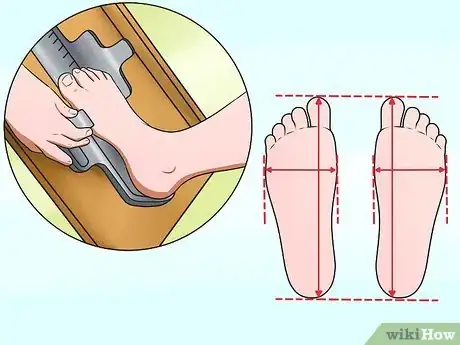


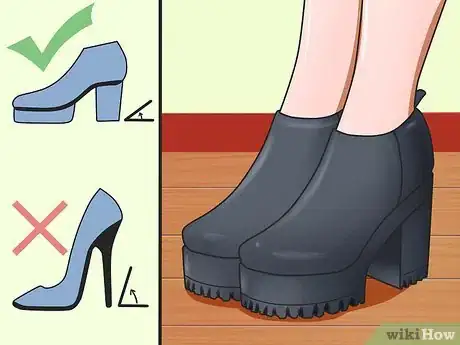
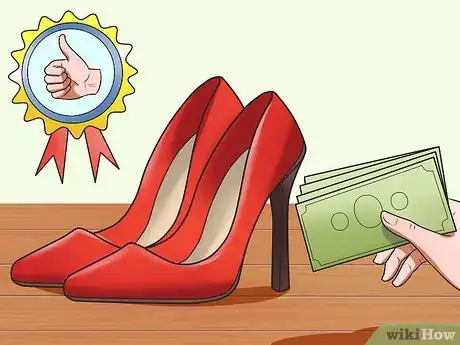

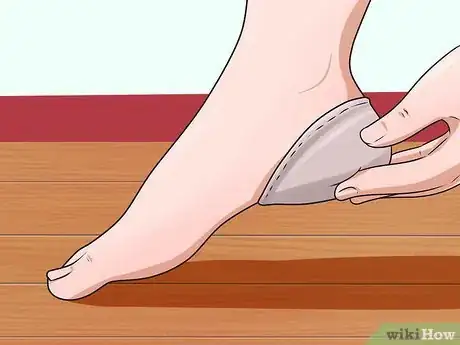
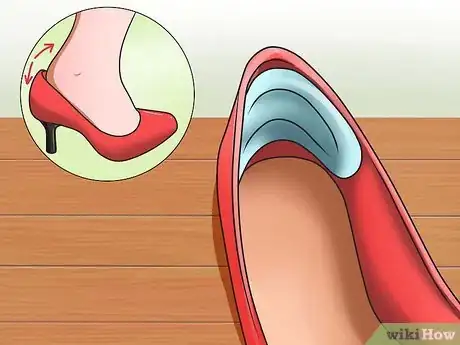
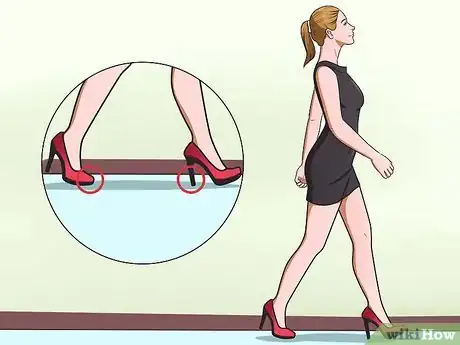
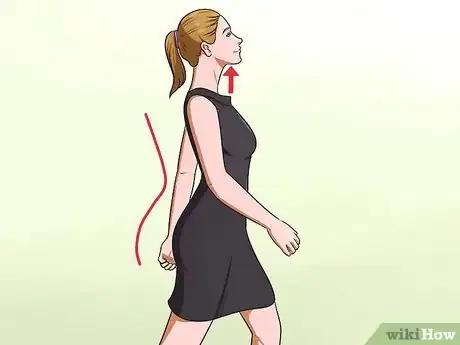
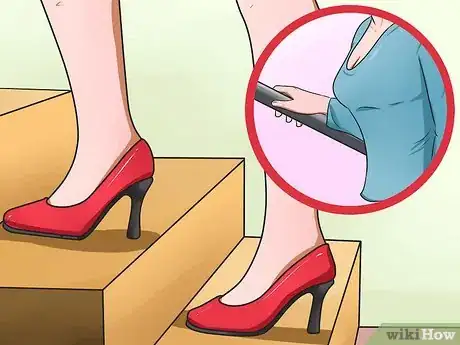
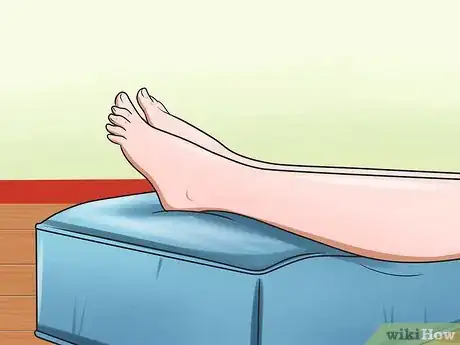
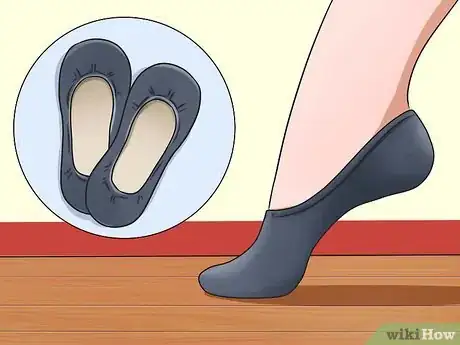
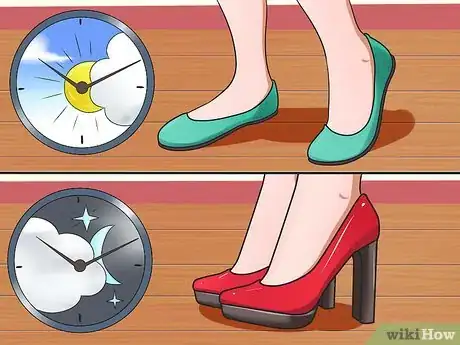
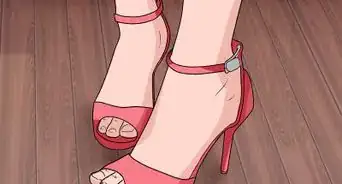
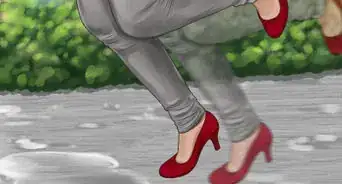
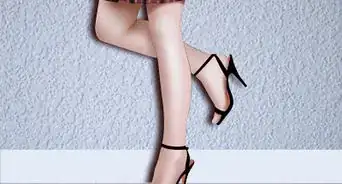

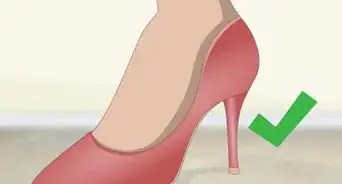

-Step-21.webp)

